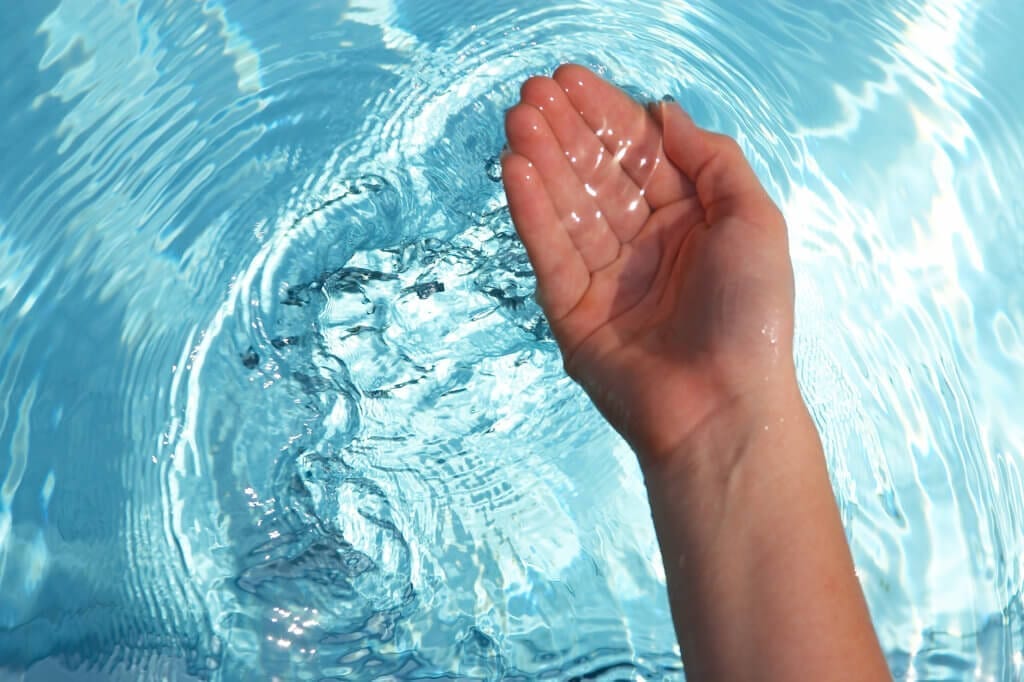When it comes to pool sanitation, chlorine has always been one of the most popular choices. It’s cheap, it’s readily available, and it’s a powerful sanitizer, oxidizer and algae deterrent. However, many people who swim in chlorine pools complain about the strong smell, burning eyes and allergic reactions that chlorine causes.
Fortunately, there are a few chlorine alternatives that can help pool owners clean, clear and healthy water with less chlorine use.
The Problem with Only Using Chlorine
There’s a general misconception that using too much chlorine in pools leads to chemical smell, red eyes, itchy skin and other harmful health issues. However, unpleasant pool chlorine odor and irritation don’t usually come from the overuse of chlorine, but rather combined chlorine, also known as chloramines. Combined chlorine is chlorine that has already been “used up” to sanitize pool water. When chlorine interacts with pollutants in the water, such as oils and sweat, they react to form combined chlorine. They also release a toxic gas that can be dangerous to the lungs of people who are repeatedly exposed to it.
How Chlorine Alternative Pool Systems Can Help
Pool owners can eliminate the harmful effects of combined chlorine by using a chlorine alternative pool sanitation methods that can handle most of the sanitation load, such as an Advanced Oxidation Process, or AOP, systems. These alternative pool solutions are ideal for people who are sensitive to chlorine and other toxic pool chemicals.
So, how are chlorine alternative methods, such as AOP systems, so effective? Because they are able to oxidize and disinfect pool water more efficiently than chlorine and without any of the negative side effects of combined chlorine. If an AOP system is handling most of the sanitation work the water, the pool will need much less chlorine. Meanwhile, the small amount of residual chlorine left in the pool will be much more effective – resulting in healthy water that smells fresh and feels soft.
Chlorine Alternative Options:
1. AOP Pool Systems
AOP systems work by producing hydroxyl radicals, which are molecules that oxidize and eliminate contaminants in pool or spa water. AOP systems do most of the work that traditional chlorine methods can’t, allowing pool owners to minimize their chlorine use. Hydroxyl radicals also destroy dangerous chlorine-resistant parasites, such as Cryptosporidium, that live in pool water. Many pool and spa owners love their AOP system because it gives them softer feeling water that is crystal clear and doesn’t smell or feel like chlorine. AOP systems also help your filter function better because they break down organic materials in the water making them easier to filter.
Some AOP systems work by combining a UV system and an ozone system to produce hydroxyl radicals. However, this way of producing hydroxyls adds complexity with only a small increase in hydroxyl production. With this method, both the UV and ozone systems must be maintained regularly, which usually requires disassembly and reassembly of each system. Adding two systems also increases the potential points of failure, meaning these types of AOP systems have more ways they can break down.
Hydroxyl-based AOP systems, such as the ones made by Clear Comfort, use a different method to produce hydroxyl radicals. Rather than combining two systems, they use one system to directly inject excited atomic oxygen into the water, which produces high concentrations of hydroxyl radicals. This method makes installation and maintenance simpler and makes the entire process more effective and efficient. Hydroxyl-based AOP systems don’t leave any toxic residuals behind and do not cause corrosion to pool or spa surfaces. However, in order for these systems to function at their peak performance, it is recommended that you run a variable-speed pump 24 hours a day so that the water is being treated constantly.
2. Saltwater Pool Systems
Saltwater pools have become popular in recent years because of the fact that they are gentler on the eyes and skin than traditionally chlorinated pools. They also allow pool owners to avoid storing and handling unsafe chemicals. Salt systems may also require less maintenance than heavily chlorinated pools, because they only produce chlorine as needed.
One of the most common misconceptions pool owners have about saltwater pool systems is that they are not chlorinated. In fact, saltwater systems produce chlorine using a different method, called electrolysis, which generates chlorine using salt cells. While saltwater systems may be preferable to heavily chlorinated pools for many people, they can still have many of the same unpleasant side effects that traditionally chlorinated pools have and are not ideal for people with chlorine sensitivities. Saltwater systems can be expensive and are complex, requiring experienced technicians even for minor problems. Pool owners should take all of these factors into account when deciding whether or not to invest in a saltwater pool system.
3. Ozone Pool Systems
Ozone generators, or ozonators, make a decent chlorine alternative option because they can eliminate harmful pollutants and allow pool owners to use less chlorine. Ozone generators work by producing ozone gas and injecting it into the pool water to oxidize contaminants. While ozone is a more potent oxidizer than chlorine, with fewer irritating side effects, it is not as potent an oxidizer as hydroxyl radicals. Also, because of the inefficiency of converting oxygen to ozone gas, ozone generators may require other complex systems such as oxygen concentrators, desiccant air dryers, mixing vessels, degas vessels and ozone destruct chambers. The complexity of these systems can make them difficult to maintain for many pool owners and technicians. In addition, ozone gas harmful to humans in high concentrations and cause corrosion to pool surfaces.
4. Bromine
Some pool suppliers recommend bromine as an alternative to chlorine. While bromine may have fewer negative effects for some people with chlorine allergies, it is in the same chemical family as chlorine and some people might still suffer allergic reactions. Bromine is also not as potent of an oxidizer as chlorine, ozone, or hydroxyl radicals, and may require combining other chemicals such as potassium peroxymonosulfate to be completely effective. Bromine can also produce an odor similar to chlorine and does not improve the feel or clarity of pool and spa water. While bromine works perfectly well along AOP systems or combined with chlorine, it is not an ideal alternative to chlorine on its own.
5. Pool Ionizers
Ionizers work by releasing copper ions and hard metal ions into pool or spa water. These ions destroy bacteria and contaminants on contact to sanitize the water and reduce chlorine demand. Some pool ionizers use electrical charges to release ions, while others use mineral cartridges that release ions through water flow. Ionizers are inexpensive to buy and replace. Additionally, ions that this chlorine alternative produces are not corrosive or damaging to pool surfaces, which means pool equipment can last longer than it would with a heavily chlorinated or saltwater pool.
However, ionizers do not oxidize pool water and can build up bather waste and organics in pool water over time. Since ionizers are not fast-acting sanitizers, they will require a combination of chlorine to sufficiently sanitize pool water. Also, if you do not carefully monitor pH levels in the pool, some ionizers can cause staining of pool surfaces.
6. PHMB
Polyhexamethylene biguanide, or PHMB, disinfects pool water by destroying bacteria cell walls. While PHMB is gentler on skin and hair than chlorine and it is easier to balance PHMB levels in the water, it is incompatible with chlorine. Since PHMB is not an oxidizer, it will need hydrogen peroxide or another oxidizing agent to sufficiently treat pool water. In addition, some pools using PHMB can often become cloudy and experience problems with pink slime and white mold. PHMB does not destroy organic contaminants and can cause “gunk” to get trapped in pool filters, causing the filter to work less effectively. While it does not produce chemical odors, PHMB can cause water to foam which can be just as irritating.
To learn more about Clear Comfort’s Award-Winning AOP Systems, click here.




